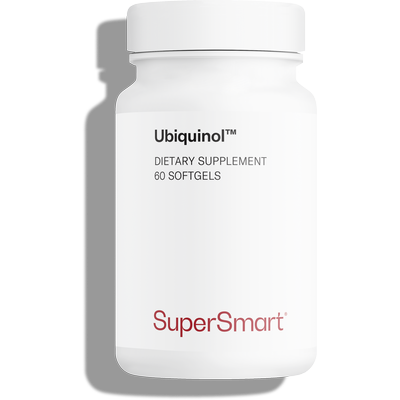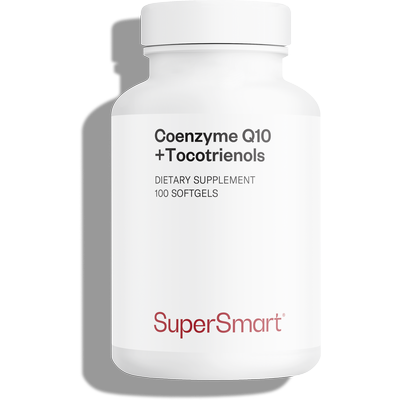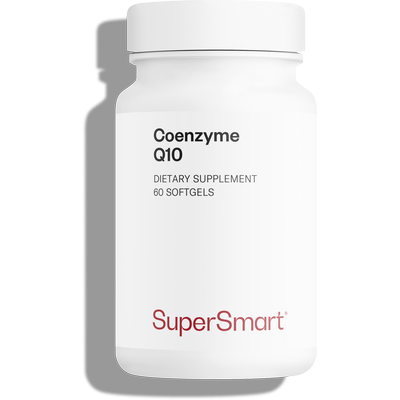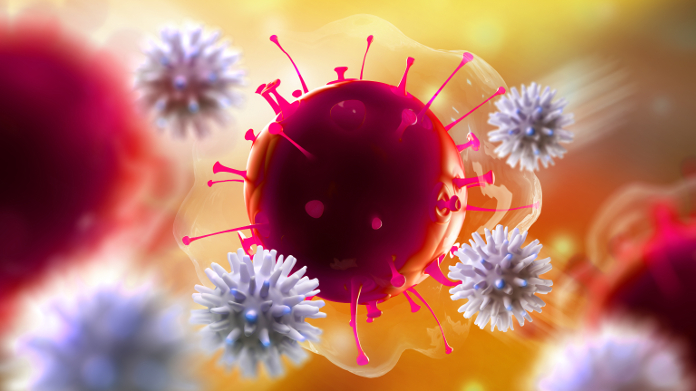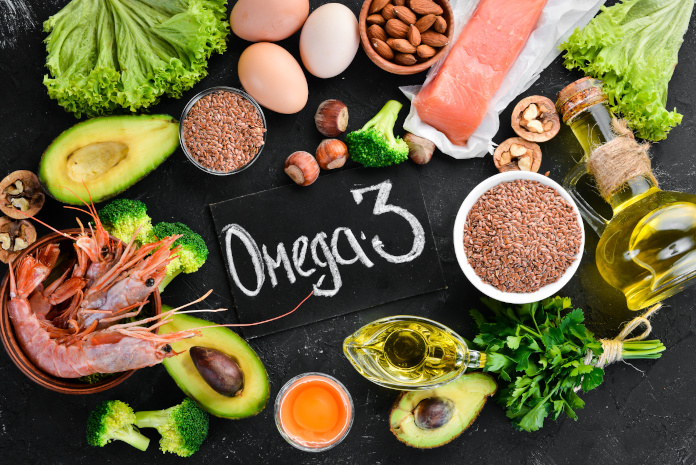Coenzyme Q10: what are the contraindications?
Though increasingly popular in the area of cellular nutrition, coenzyme Q10 does have certain contraindications. What exactly are they?

Coenzyme Q10: definition and benefits
First discovered and isolated in the United States in 1957, coenzyme Q10 (often abbreviated to CoQ10) is structurally similar to vitamin K and is found throughout the body (1). Indeed it’s this ubiquity which gives it its other name of ubiquinone.
Coenzyme Q10 is involved in the mitochondrial respiratory chain where it ensures that nutrients are converted into energy directly usable by cells (2). Indeed, it is found at greater concentrations in energy-hungry organs such as the liver, kidneys and heart muscle (3).
Production of CoQ10 unfortunately tends to decline as a result of ageing, lifestyle, and taking certain medications (tricyclic antidepressants and statins, for example) (4-5). It has also been observed that people suffering from heart failure, poor gum health, metabolic abnormalities and muscle pain often have lower levels (6-7).
Coenzyme Q10 supplements (such as Coenzyme Q10, CoQ10+Tocotrienols and Ubiquinol) have thus been growing in popularity in recent years.
Coenzyme Q10: risks and contraindications
Though coenzyme Q10 supplementation is considered safe by the scientific community, it is contraindicated in certain, specific situations.
Pregnant women
Firstly, given the inadequate data available on safety, it is contraindicated for women who are pregnant or breastfeeding, as a precautionary measure.
CoQ10 and potential risks for diabetics
Those suffering from diabetes also need to exercise caution. While coenzyme Q10 is currently at the heart of promising studies on blood sugar regulation, it could, in some patients, cause hypoglycaemia, though this is the subject of much discussion in scientific journals (8-9). The literature also reports rare cases of auto-immune insulin syndrome in non-diabetics (10). While it is still possible to supplement under medical supervision, careful monitoring of blood sugar levels is essential.
Interactions between coenzyme Q10 and certain anticoagulants
Due to its chemical similarity to vitamin K, CoQ10 could also lower the efficacy of vitamin K antagonist-type anticoagulant drugs. Some studies have reported reduced sensitivity to warfarin, a treatment routinely prescribed in coordination with heparin for pulmonary embolisms or thrombophlebitis (11-12). As coenzyme Q10 appears to accelerate its metabolism, there is an increased risk of blood clots (13), although a crossover trial conducted on 24 subjects taking warfarin did not identify any sensitivity interactions (14). In view of the somewhat contradictory conclusions in this respect, it is again best to consult a health professional before starting supplementation.
Taking CoQ10 during treatment for cancer: is there a risk?
Finally, the issue of CoQ10 supplementation during cancer treatment is the subject of much debate. While a number of studies point to its potential protective effect against cardiotoxicity induced by certain chemotherapy drugs, it may, at the same time, reduce the efficacy of pro-oxidant therapeutic strategies such as radiotherapy, cyclophosphamides and certain anti-cancer antibiotics – where the generation of free radicals plays a key role in killing cancer cells (15-16). Here again, it is crucial not to supplement without medical advice.
Coenzyme Q10: side-effects?
Coenzyme Q10 supplements are generally very well tolerated since the molecule is already naturally present in the body (17). Side-effects are therefore rare and mostly mild for healthy individuals, being mainly limited to minor gastrointestinal problems (nausea, diarrhoea).
CoQ10: which supplement to choose
Since production of coenzyme Q10 tends to decline from the age of 30 onwards, here are some tips for increasing your intake (18). While it is found in foods such as beef, chicken, oily fish and some oleaginous fruits, you can easily and significantly boost your intake by taking coenzyme Q10 supplements with high bioavailability (such as Coenzyme Q10, which comes in oil-based capsules for maximum absorption).
In some synergistic formulations, CoQ10 is combined with fat-soluble compounds like vitamin E (tocotrienols and tocopherols) which increases its uptake ten-fold and redirects its action towards the body’s ‘fattier’ organs such as the heart (the CoQ10+Tocotrienols combo is based on a patented blend of the full spectrum of tocotrienols plus alpha-tocopherol) (19).
For it to be mobilised by cells, ubiquinone must first be converted by enzymes into ubiquinol. It’s possible to supplement directly with this form of CoQ10 which is biologically-active and known to be the best absorbed (try Ubiquinol, which again, comes in the form of softgels) (20).
SUPERSMART ADVICE
References
- Saini R. Coenzyme Q10: The essential nutrient. J Pharm Bioallied Sci. 2011 Jul;3(3):466-7. doi: 10.4103/0975-7406.84471. PMID: 21966175; PMCID: PMC3178961.
- Raizner AE. Coenzyme Q10. Methodist Debakey Cardiovasc J. 2019 Jul-Sep;15(3):185-191. doi: 10.14797/mdcj-15-3-185. PMID: 31687097; PMCID: PMC6822644.
- Rabanal-Ruiz Y, Llanos-González E, Alcain FJ. The Use of Coenzyme Q10 in Cardiovascular Diseases. Antioxidants (Basel). 2021 May 10;10(5):755. doi: 10.3390/antiox10050755. PMID: 34068578; PMCID: PMC8151454.
- Deichmann R, Lavie C, Andrews S. Coenzyme q10 and statin-induced mitochondrial dysfunction. Ochsner J. 2010 Spring;10(1):16-21. PMID: 21603349; PMCID: PMC3096178.
- Moreno-Fernández AM, Cordero MD, Garrido-Maraver J, Alcocer-Gómez E, Casas-Barquero N, Carmona-López MI, Sánchez-Alcázar JA, de Miguel M. Oral treatment with amitriptyline induces coenzyme Q deficiency and oxidative stress in psychiatric patients. J Psychiatr Res. 2012 Mar;46(3):341-5. doi: 10.1016/j.jpsychires.2011.11.002. Epub 2011 Nov 26. PMID: 22118833.
- Zozina VI, Covantev S, Goroshko OA, Krasnykh LM, Kukes VG. Coenzyme Q10 in Cardiovascular and Metabolic Diseases: Current State of the Problem. Curr Cardiol Rev. 2018;14(3):164-174. doi: 10.2174/1573403X14666180416115428. PMID: 29663894; PMCID: PMC6131403.
- Ghasemi S, Torab Z, Shirmohammadi A, Babaloo A, Johari R, Farhadi F, Mobasseri M, Mohammadi H. Evaluation of the effect of coenzyme Q10 supplementation along with scaling and root planing (SRP) on periodontal and gingival indices in controlled diabetic patients. J Adv Periodontol Implant Dent. 2022 Mar 13;14(1):32-37. doi: 10.34172/japid.2022.003. PMID: 35919443; PMCID: PMC9339722.
- Shen Q, Pierce JD. Supplementation of Coenzyme Q10 among Patients with Type 2 Diabetes Mellitus. Healthcare (Basel). 2015 May 21;3(2):296-309. doi: 10.3390/healthcare3020296. PMID: 27417763; PMCID: PMC4939545.
- Eriksson JG, Forsén TJ, Mortensen SA, Rohde M. The effect of coenzyme Q10 administration on metabolic control in patients with type 2 diabetes mellitus. 1999;9(2-4):315-8. doi: 10.1002/biof.5520090229. PMID: 10416046.
- Kusano Y. Insulin autoimmune syndrome possibly caused by coenzyme Q10. J Rural Med. 2019 May;14(1):132-137. doi: 10.2185/jrm.2975. Epub 2019 May 30. PMID: 31191778; PMCID: PMC6545416.
- Landbo C, Almdal TP. Interaktion mellem warfarin og coenzym Q10 [Interaction between warfarin and coenzyme Q10]. Ugeskr Laeger. 1998 May 25;160(22):3226-7. Danish. PMID: 9621803.
- Heck AM, DeWitt BA, Lukes AL. Potential interactions between alternative therapies and warfarin. Am J Health Syst Pharm. 2000 Jul 1;57(13):1221-7; quiz 1228-30. PMID: 10902065.
- Zhou Q, Zhou S, Chan E. Effect of coenzyme Q10 on warfarin hydroxylation in rat and human liver microsomes. Curr Drug Metab. 2005 Apr;6(2):67-81. doi: 10.2174/1389200053586091. PMID: 15853759.
- Engelsen J, Nielsen JD, Hansen KF. Effekten af Coenzym Q10 og Ginkgo biloba på warfarindosis hos patienter i laengerevarende warfarinbehandling. Et randomiseret, dobbeltblindt, placebokontrolleret overkrydsningsforsøg [Effect of Coenzyme Q10 and Ginkgo biloba on warfarin dosage in patients on long-term warfarin treatment. A randomized, double-blind, placebo-controlled cross-over trial]. Ugeskr Laeger. 2003 Apr 28;165(18):1868-71. Danish. PMID: 12772396.
- PDQ Integrative, Alternative, and Complementary Therapies Editorial Board. Coenzyme Q10 (PDQ®): Health Professional Version. 2022 Jun 7. In: PDQ Cancer Information Summaries [Internet]. Bethesda (MD): National Cancer Institute (US); 2002-. Available from: https://www.ncbi.nlm.nih.gov/books/NBK65890/
- Yasueda A, Urushima H, Ito T. Efficacy and Interaction of Antioxidant Supplements as Adjuvant Therapy in Cancer Treatment: A Systematic Review. Integr Cancer Ther. 2016 Mar;15(1):17-39. doi: 10.1177/1534735415610427. Epub 2015 Oct 26. PMID: 26503419; PMCID: PMC5736082.
- Hidaka T, Fujii K, Funahashi I, Fukutomi N, Hosoe K. Safety assessment of coenzyme Q10 (CoQ10). 2008;32(1-4):199-208. doi: 10.1002/biof.5520320124. PMID: 19096117.
- Temova Rakuša Ž, Kristl A, Roškar R. Stability of Reduced and Oxidized Coenzyme Q10 in Finished Products. Antioxidants (Basel). 2021 Feb 27;10(3):360. doi: 10.3390/antiox10030360. PMID: 33673604; PMCID: PMC7997171.
- Wang XL, Rainwater DL, Mahaney MC, Stocker R. Cosupplementation with vitamin E and coenzyme Q10 reduces circulating markers of inflammation in baboons. Am J Clin Nutr. 2004 Sep;80(3):649-55. doi: 10.1093/ajcn/80.3.649. PMID: 15321805; PMCID: PMC1356523.
- Zhang Y , Liu J , Chen XQ , Oliver Chen CY . Ubiquinol is superior to ubiquinone to enhance Coenzyme Q10 status in older men. Food Funct. 2018 Nov 14;9(11):5653-5659. doi: 10.1039/c8fo00971f. PMID: 30302465.
Keywords
56 Days
Very happy with the order and the…
Very happy with the order and the prompt team's response to an identified issue with my order.
KUQI Fatmir
63 Days
15 + years as a customer
I have been using their products for over 15 years as I find both the quality and pricing excellent.
Del Chandler
65 Days
Good quick delivery
Good quick delivery
Timothy O Shea
66 Days
Good service
Good communication following order. Product came within the time frame and was well packaged. The only confusing thing I found was in checking out. For some reason it is not clear how to do so and the current system should be improved.
Joe O Leary
75 Days
Simple and fast.
Simple and fast.
Nina
76 Days
Great product was definitely what is…
Great product was definitely what is says and arrived on without issue
customer
82 Days
I love reading those product facts on…
I love reading those product facts on Supersmart.com. Effective health products making permanent changes to my blood-work results and testes. However, I also have to order capsules from other websites.
NORDGULEN Olav
84 Days
Great products
Great products Very easy to choose, to order… and to get at home
Federica mastrojanni
87 Days
Service rapide et bons produits
Service rapide et bons produits
customer
88 Days
Good products and fast delivery
Good products and fast delivery
Trusted
93 Days
Does what it says on the can
I believe in this product Made to highest standard The ordering process is straightforward Delivery time prompt Excellent product, excellent service Happy customer ❤️
Sheba Kelleher
98 Days
Excellents produits
Excellents produits. Rien à dire si ce n'est qu'ils sont très chèrs.
MJS_France
100 Days
Very good supplement
Very good supplement
Glaveash
101 Days
Supersmart supplements are really…effective
Supersmart supplements are really effective and have helped me and family members and friends to improve their health including some of us with severe health problems including some with no existing medical treatment.
Anne Georget
102 Days
SuperBig Supersmart
SuperBig Supersmart
Pierre

